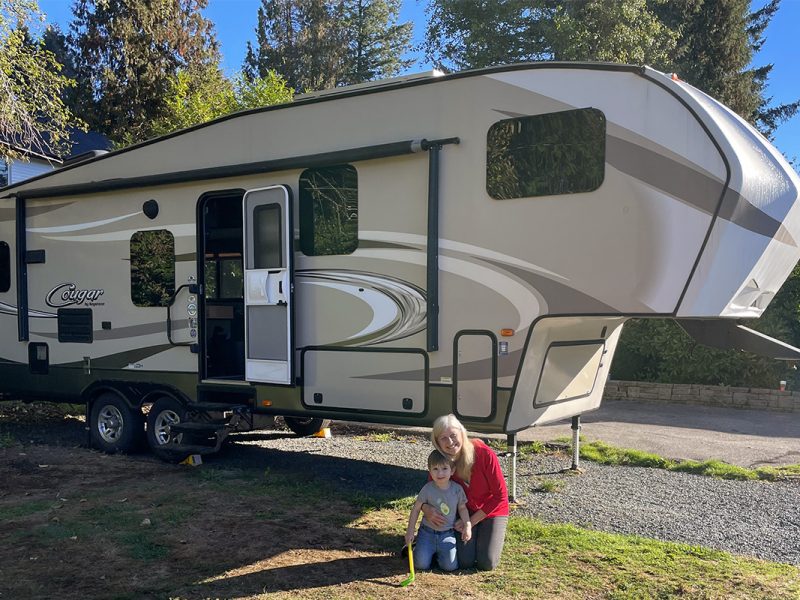
When The Discourse hosted its story circle on housing earlier this year, a former Nanaimo Affordable Housing Society (NAHS) tenant asked us to look into what he had discovered was the organization’s name change to Ballenas Housing Society.
Other tenants contacted us about this as well; one email stated that “no one was personally advised” and as a result they were confused when their rent was direct-deposited to an organization with a different name from NAHS.
NAHS — which was at the centre of The Discourse’s investigative series into low-income seniors’ housing in Nanaimo last year — announced the rebranding of the society to Ballenas on March 8, with a new logo and website.
The name change and rebranding “better reflect the growing number of communities it serves on Vancouver Island,” states the organization’s March 8 press release, and was a board decision, according to CEO Andrea Blakeman.
It was not a response to ongoing coverage by The Discourse, but was rather “in discussion behind the scenes (probably) close to four years ago,” she added, via email. “As you may or may not be aware, it can be a very slow process.”
Part of the society’s “refresh of the mission and vision statements” includes a slight shift in emphasis from providing affordable housing to providing housing for people with low to moderate income.
“Most non-profit housing societies do not have the word ‘affordable’ in their names,” stated Blakeman, when asked why the word was dropped from the society’s name. “The word ‘affordable’ is quite subjective. What is affordable for one renter can be quite different than what is affordable for another.”
The Canada Mortgage and Housing Corporation considers the cost of housing to be affordable if it is less than 30 per cent of a household’s pre-tax income and rental housing that meets this criteria is exceedingly rare.
In Nanaimo, about 30 per cent of residents are renters, 40 per cent of whom are paying more than 30 per cent of their income on housing, according to the City of Nanaimo’s latest housing needs report. BC Housing offers roughly 2,000 subsidized units in Nanaimo, which includes units rented by Ballenas. (This figure does not include rental supplements like SAFER.) In 2022, 762 residents were on the housing registry waitlist. Some Ballenas tenants who spoke with The Discourse faced rent increases and nicknamed NAHS “Nanaimo Unaffordable Housing Society.”
In total, Ballenas oversee 730 rental units in Nanaimo, mostly serving low-income seniors, making them one of the city’s largest landlords.
Their new four-storey 53-unit apartment building at 6010 Hammond Bay Road will be ready for tenants later this year. Half of the units are for individuals with low to moderate incomes and 11 units are for people with “very low incomes.” For these residents, rent can’t exceed 30 per cent of their gross monthly income. The remaining 16 units are below market — starting at $1,530 for a one-bedroom and $1,755 for a two-bedroom.
According to the city’s staff report for the Hammond Bay development, a housing agreement ensures that the development will be occupied by individuals whose collective annual before-tax income does not exceed the BC Housing-determined Housing Income Limit for Nanaimo, and also guarantees that 12 months’ rent for the dwelling unit “does not exceed 30 per cent of the occupants’ collective before tax annual income.”
The city has waived $221,000 in development charges for this project.
On May 15, Blakeman and Ballenas board member Bob Moss addressed Nanaimo city council to request assistance with the potential construction of another affordable housing project on Bruce Avenue and Eighth Street. The five acre property, located at 505 Eighth Street, is owned by the Salvation Army and is currently the site of a community church.
Ballenas aims to build 80 to 100 affordable units on the site. They also intend to build some market rental housing there “if we can make that fit,” added Moss.
The society asked the city to expedite their development permit and rezoning application processes, as well as to agree to a reduced scope of works and services required that would limit the Salvation Army’s costs to $500,000, of which the city would contribute $300,000.
“We have to move much faster if we’re going to get ahead of the challenges that our city faces,” Moss told council and mayor Leonard Krog. “And one of those major challenges is the lack of housing for those on limited incomes.”
Council approved a development variance permit to reduce required works and services for the subdivision, and no additional applications have been received, according to Rowett.
The society also recently expanded operations into Parksville, with a new $30 million, 87-unit complex on Moilliet Street that opened last month. These buildings offer subsidized and below-market rental units “designated for independent, low-to-moderate-income residents.”
Sixty of these units will feature rents geared to income, including 17 units reserved for residents with very low incomes, and the other 27 units will be rented at market rates, according to BC Housing. The market rentals start at $1,360 for a one-bedroom unit, $1,487 for a one-bedroom-plus-den unit, $1,742 for a two-bedroom unit and $2,422 for a three-bedroom townhome.
Meanwhile, tenants of Ballenas continue to express concerns with the housing provider’s policies in letters to The Discourse and online, with one tenant citing ongoing issues with their cable package and parking, writing, “I am still trying to get another letter written to them about some other issues [that] they seem to ignore so far, frustrating.”



